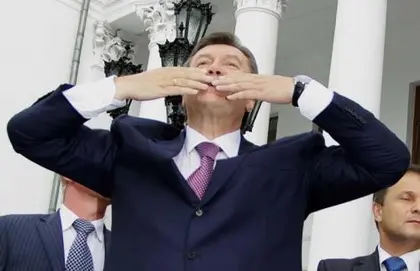“Tymoshenko has no chance of winning,” he told the fawning TV presenter.
With a 10 percent first-round lead and internal polling figures circulated among journalists predicting an enormous margin, Yanukovych has the air of a man who is just waiting for confirmation of what he already knows. The majority of his trips since Jan. 17 have been to strongholds in the south and east. Many have been cancelled because of fog or ice. Not that this seems to have concerned his team much: they clearly believe that his victory in the second round is already sewn up.
- Receive the latest Ukraine news bulletins for today.
- Find the latest Ukraine news published as of today.
JOIN US ON TELEGRAM
Follow our coverage of the war on the @Kyivpost_official.
“The key for us now is to avoid any mistakes,” said Denis Ivanesko, his spokesperson. Hence the decision to leave Tymoshenko facing an “empty space” in the scheduled televised debate on Feb. 1.
With voter disillusionment running high in the west, typically Tymoshenko territory, many analysts predict that Yanukovych’s core vote will be enough to bring him the presidency.
Yanukovych and his team are already looking ahead past the elections. He has been reaching out to the West with a number of interviews in American, British and German publications and an appearance via TV link at the economic forum in Davos last week. When the news that parliament had voted to dismiss Interior Minister Yuriy Lutsenko, his team was ecstatic. “The most important thing this shows is that we have a majority in parliament,” said Ivanesko. Yanukovych has repeatedly said he will try to oust Tymoshenko as prime minister and form a new coalition in parliament, led by his Party of Regions.
But this bravado hides a certain level of uncertainty. The party meeting in Simferopol was closed to journalists, but one attendee told the Post that Yanukovych in strong terms stressed the need to get the vote out. Crimea may have voted en masse for the Party of Regions leader, but this time round he scored around 20 percent less than five years ago. Sergiy Tigipko’s strong showing, with 11 percent on the peninsula, was one reason behind the drop. More worryingly for him, Tymoshenko’s 12 percent was almost double the score she achieved in the 2007 parliamentary elections, with more votes to come after the Mejlis, the unofficial representative body of the Crimean Tatars, endorsed the prime minister.
Against this background, it is perhaps strange that in Yanukovych’s TV performance he and his supporters spent more time congratulating themselves than putting forward arguments and policies. The usual promises reared their heads: pensions will double, corruption will disappear and naturally, this being Crimea, the Russian language will gain proper status. Yanukovych has finally dropped the pledge to make Russian a second state language, a tacit admission that he’ll never gather the two-thirds majority needed in parliament to change the constitution.
Now he talks about adopting the European Charter for Regional or Minority Languages. In fact, Ukraine already ratified the charter in 2005, but not in full. One of the main concerns expressed in questions to Yanukovych was the requirement as of this year for high school leavers to take their university entrance exams in Ukrainian.
“Provisions will be made for the unhindered use of the Russian language in Ukraine in business, education, medicine and legal proceedings,” Yanukovych pledged.
Unsurprisingly, Russia was high on the agenda. Yanukovych said he didn’t believe the arrival of Russia’s new ambassador meant the end of the ‘cold war’ between the countries. “There are many questions that the current authorities messed up in relations between Ukraine and Russia, and they need to be untangled,” he said.
“I will vote for Yanukovych because he will build better relations with Russia. He will bring order to the country,” said Andriy, part of a small crowd outside the television studio kitted out in Party of Regions coats, waving Yanukovych flags and chanting their leader’s name.
The questions may have come in thick and fast throughout the day, but they were all softballs. The Regions camp clearly believe that inertia is enough to take the presidency, with no need to engage people who do not share his views, to try to win over opponents or wavering voters.
Even inside the cocoon, however, Yanukovych managed a gaffe: When promising to assign funds to the restoration of Anton Chekhov’s house museum in Yalta, he called the writer, “a great poet.”
Not a cardinal error, perhaps, but a telling one. He may have been trained to give shorter, sharper answers. He may have improved his Ukrainian. But off script and out of his comfort zone, Yanukovych still struggles. In Lviv last week, he called the locals “the genocide of the nation” (he apparently wanted to say “the gene pool of the nation”).
This could be the true test of Yanukovych if he achieves the victory he is predicting: to be president of the whole nation, not just those who voted for him. Then he’ll have to field not just the softballs in Crimea, but hardballs in the west about topics such as genocide.
Kyiv Post staff writer James Marson can be reached at marson@kyivpost.com.
You can also highlight the text and press Ctrl + Enter




